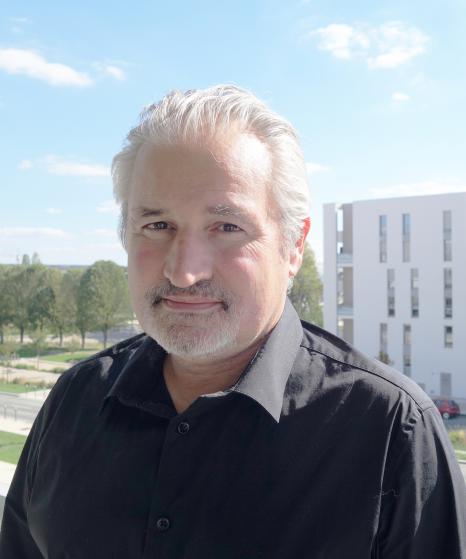
Jean-Christophe Tavanti: Economics & Management at the crossroads of science
Jean-Christophe Tavanti is a lecturer at the ENS Paris-Saclay Economics Centre (CEPS - Univ. Paris-Saclay, ENS Paris-Saclay), former Director of the Department of Economics & Management at ENS Paris-Saclay and, since 2020, Deputy Director of Education at the Graduate School Economics & Management of Université Paris-Saclay. For this economist, a specialist in financial markets, economics & management have an increasingly important role to play alongside other disciplines, at the crossroads of the humanities and social sciences and the hard sciences.
Jean-Christophe Tavanti enrolled in economics at Université d’Aix-Marseille in the early 1980s, somewhat by chance. After obtaining a scholarship, he decided to undertake a PhD thesis at EHESS in economics and mathematics on the problems of financial markets. This is a subject that he has since helped to update. He defended his PhD thesis in 1994 and spent a year at Université de Toulon et du Var as a temporary teaching and research associate (ATER). In September 1995, he obtained a position as a lecturer at ENS Paris-Saclay (formerly ENS Cachan).
In the CEPS laboratory, created during the ENS's recent move to the Saclay plateau, Jean-Christophe Tavanti's research used specific mathematics and computer tools. "I simulate artificial financial markets," he explains. This academic field, which is around 20 years old, is now clearly on the rise, according to the lecturer. "We programme virtual financial markets using the Netlogo tool, an open-source software. We can therefore use different stakeholders and protocols to test taxation methods or study statistical facts found in reality." This effective method is widely used in class. It complements all the others used in economics and management, as well as in other disciplines such as sociology and meteorology.
More "teacher" than "researcher"
"Teaching is my job!" says Jean-Christophe Tavanti. “I have always been willing to take on teaching responsibilities." This love of teaching originated when he was writing his thesis. "In an association, I taught mathematics courses to long-term unemployed people without a diploma and to young mothers. It was then, with no teaching experience, that I first felt the satisfaction of making a difference in the daily lives of people who needed it."
As soon as he arrived at ENS Paris-Saclay, he took charge of preparing students for the 'agrégation' in economics and management. "The versatility of the courses (economics, statistical mathematics, etc.) required a lot of preparation time, like in the 2-year preparatory course for a competitive exam," he recalls. Jean-Christophe Tavanti was in charge of the 'License 3' (3rd-year of the undergraduate programme), then the Master's 1 in Economics, and then Director of the Department of Economics and Management from 2017 to 2020. This department has just merged with the Department of Humanities and Social Sciences. Today, Jean-Christophe Tavanti is responsible for degrees at ENS Paris-Saclay. Since 2016, he has also been Vice Chair of the Economics-Management competitive entrance exam.
On stage!
Jean-Christophe Tavanti plans his classes like a theatre performance. "It is good or less good depending on the day," he smiles. “But most of the time, the high level of participation and the positive feedback from students during and after the course reveal their satisfaction." His method is based on intuition and analogy. "Since there is a lot of mathematics in my courses, I always tell the full story beforehand. Because if we let ourselves be dominated by mathematics, which is really just a tool, we understand nothing. If you can see where you want to get to, you just have to invest a bit in the tool when you get home."
Sometimes, the lecturer's investment in the students is rewarded by the publication of one of their articles. The education, which is based on research, must be constantly updated. Economics and management are also disciplines that are constantly evolving with the times. "When economic crises occur, we say we didn't see it coming," he says. We need to deconstruct preconceptions about the financial markets by comparing what the academic and professional fields say. Sometimes they agree, sometimes not. I teach students to be critical."
Creation of the Graduate School Economics & Management
Since 2020, Jean-Christophe Tavanti has been Deputy Director of Education at the Graduate School Economics & Management of Université Paris-Saclay. This Graduate School comprises more than a thousand students and 250 lecturers from several institutions in the University: Jean Monnet Faculty, Université d’Évry, Université de Versailles - Saint-Quentin-en-Yvelines (UVSQ), ENS Paris-Saclay. In addition to a Master's degree in economics common to all four institutions, the Graduate School currently offers eleven 1st-year Master's degrees’ tracks and 37 2nd-year Master's degrees’ tracks in economics. "The education strategy today is based on sharing and developing cross-functional projects," insists the Deputy Director. It is also based on the scientific strategy that has been clearly defined by the Graduate School. As a result, we are working on the links between Masters and PhDs. Our goal is to make economics and management even more visible to the other so-called "hard" sciences." In addition to the joint Master's degree, many economics tracks are taught entirely in English. "Our goal is to eventually have 50% international students."
Despite geographical distance and the health crisis caused by COVID-19, which has led to teleworking practices that are not conducive to meetings, bonding events are gradually helping to create a common identity for the Graduate School. This was the case for the graduation ceremony that recently took place at Massy Opera House. "We are very much supported by Université Paris-Saclay," concludes Jean-Christophe Tavanti. "I am convinced that the Graduate Schools will eventually form the core of the University."

